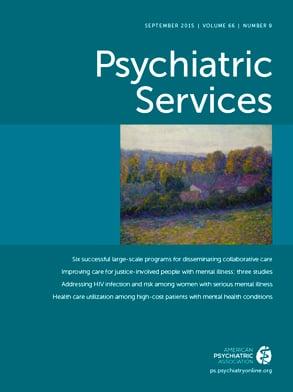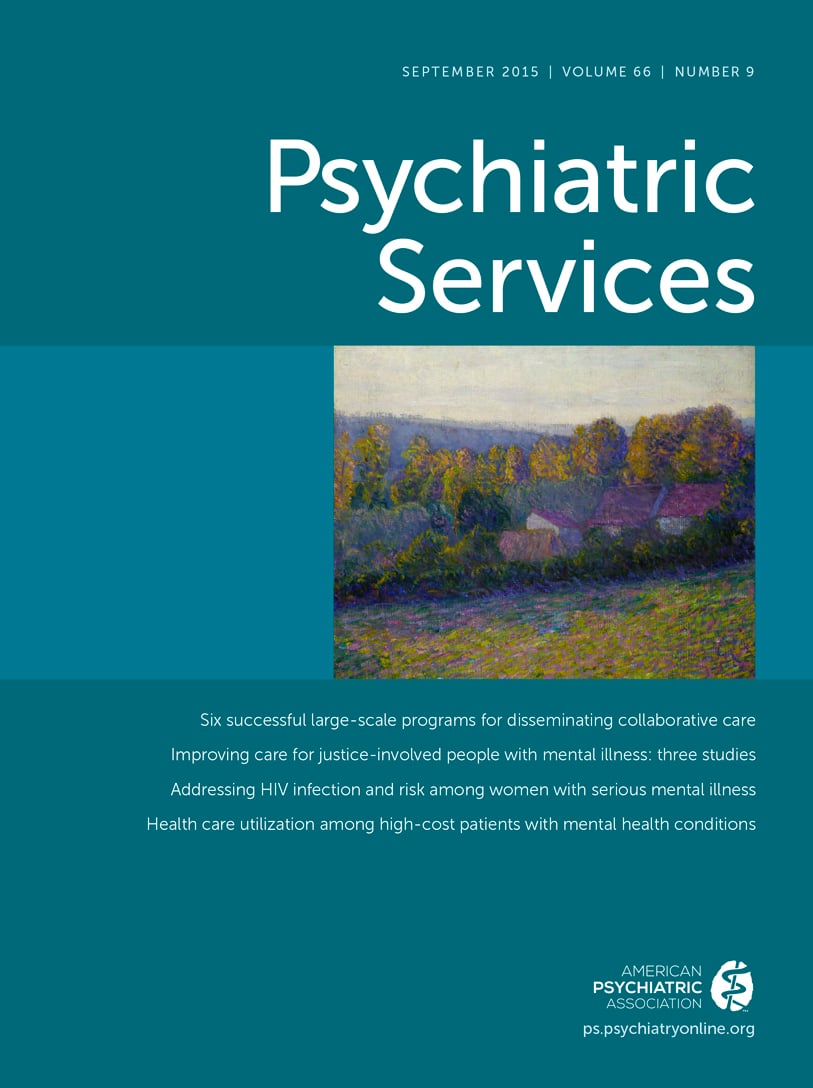Given the pervasive impact of behavioral health and the underutilization of electronic health records (EHRs) among behavioral health specialists, priority should be placed on designing systems that promote use of EHRs in behavioral health practice settings (
1,
2). Improving EHR adoption may enhance patient engagement, decrease emergency room visits, and improve clinical outcomes. To ensure equitable adoption of the technology, however, behavioral health practice policies must provide a more favorable environment for use of EHRs, for example, by embracing assertive responses to mental illness stigma and a commitment to innovation and collaboration. In this Open Forum, we discuss barriers to adoption of EHRs in behavioral health care settings and encourage mental health providers to advocate for improved use of this important technology in the treatment of mental illness.
The Health Information Technology (HIT) for Economic and Clinical Health Act (HITECH) of 2009 has spurred the investment of over $35 billion to build an innovative HIT infrastructure centered on the “meaningful use” (MU) of EHRs. The drive to adopt HIT is closely linked to health care reform, which aims to improve quality of care and patient access while lowering health care costs. MU initiatives have encouraged providers to adopt EHR technology by providing financial incentives for the purchase and maintenance of these systems and for meeting criteria and adopting strategies for enhancing productivity and quality indicator outcomes. According to the Centers for Medicare and Medicaid Services (CMS), over 400,000 providers have registered for MU programs, and nearly 320,000 eligible providers and hospitals have already received more than $15 billion in incentive funds. Striving to meet similar goals, other national models and quality initiatives—such as the CMS Physician Quality Reporting System, patient-centered medical homes, and accountable care organizations—have focused on expanding the use of HIT and improving clinical outcomes.
These programs are making significant strides to encourage providers and hospitals to adopt EHRs. Since 2009, EHR adoption by various health care systems has expanded by nearly 45% across the United States (
1). However, disparities exist among the types of providers that are adopting EHRs. In 2012, a report by the behavioral health roundtable of the Office of the National Coordinator (ONC) for HIT indicated that only about 20% of behavioral health organizations surveyed had fully adopted EHRs, compared with 60% of the general population of health care providers (
2).
Patients with serious mental illness are more likely to die early from general medical illness, suicide, or medication risk, compared with patients without mental illness (
3,
4). Even persons with mild to moderate mental illness can be mentally and physically incapacitated because of a behavioral health disorder. Tragically, behavioral health is an underinsured area; many persons with mental illness lack proper access to care and medication, a problem that can be addressed, in part, by improving HIT systems.
Barriers to Behavioral Health Care Utilization
Multiple barriers impede utilization of EHRs among behavioral health care providers. First, although the number of psychiatrists in solo practice has been decreasing over the past 30 years, 17% of early-career psychiatrists and 29% of mid-career psychiatrists continue as solo practitioners (
5). Although EHRs can demonstrate long-term cost savings for providers, the initial financial investment may be too great for a solo or a small group practice to bear (
6). For example, psychiatrists in solo practice may not have the cash flow to pay for training staff in EHR implementation, including costs for technical support personnel.
Concerns about confidentiality in the care of patients with mental disorders have consistently been a barrier to the adoption of EHRs. In a recent study by Salomon and colleagues (
7), a majority of mental health clinicians expressed concern over privacy issues that arose after their health systems adopted EHRs, with 63% expressing low willingness to record confidential information in an EHR and 83% preferring that the EHR system be modified to limit routine access to their patients’ psychiatric records (
7). Psychotherapy notes have additional protections under HIPAA, and substance abuse treatment is protected under federal confidentiality laws. However, “off the shelf” EHRs may not have built-in mechanisms for restricting access to sensitive records. In addition, some states have more protective laws concerning access to mental health records within a health care practice or system (for example, D.C. Code 7–1203.01). To comply with these laws, practices would need to give special consideration to work flow issues to ensure that EHRs of individuals treated for mental health problems are not accessible by all providers and practitioners within the health system.
Stigma is also a barrier to utilization of EHRs in behavioral health services. Stigma is one of several reasons that behavioral health care has traditionally been isolated and fragmented from treatment of other illnesses. In fact, stigma can affect individual patient care and policies that determine the changing health care landscape. Because of concerns about stigma, providers are often resistant to integrating behavioral health information into an EHR, even when confidentiality is assured, resulting in poor care coordination and decreased quality of care for individuals with mental illness (
8).
Perhaps because of difficulty in resolving the conflict between privacy and existing laws, mental and substance use disorders have been “carved out” of many of the initiatives designed to improve care coordination and information sharing, such as the HITECH Act of 2009. This trend likely contributes to the significant lag in adoption of EHRs among behavioral health care providers. Currently, behavioral health care providers are not eligible to receive technical assistance provided through ONC-sanctioned regional extension centers under the HITECH Act. Mental health professionals providing care at certain behavioral health care settings are also ineligible for MU incentives for adoption of EHRs. These policy disincentives contribute to further inequities of EHR adoption in behavioral health care.
Overcoming Barriers to Underutilization of EHRs
Given the concerns of mental health professionals about EHRs, it is imperative to consider the collective voices of these professionals regarding this technology. Behavioral health professionals should be encouraged to address their concerns about EHRs with the vendors that design electronic record systems and other HIT tools. Identifying barriers to underutilization of EHRs is an important step in this process. By ensuring that platforms support primary care and behavioral health care integration models and maintain strong confidentiality and privacy controls, EHR systems can promote widespread and successful adoption of EHRs and maintain a commitment to health equity (
9).
The 2012 ONC HIT behavioral health roundtable report indicated that privacy and confidentiality of information, such as patient drug use information, are extremely important to behavioral health care practitioners and agencies, such as the Substance Abuse and Mental Health Services Administration (
2). For example, roundtable participants recommended that primary care providers be fully informed of federal regulations concerning confidentiality of alcohol and drug abuse documented in patient records, which include appropriate protocols for receiving, storing, and managing data. This recommendation, in part, stemmed from patients’ perceived fear of public stigma regarding their addiction, as well as fear of prosecution associated with substance use. Efficient communication between primary care and behavioral health care providers is integral to improving care coordination and access to care.
Behavioral health care professionals recognize opportunities to strengthen HIT systems in ways that support improved mental health care, including promoting policy agendas that facilitate improvements. For example, mental health providers are among the leading proponents of the proposed Behavioral Health Information Technology Act of 2011, which would extend Medicare and Medicaid incentive payments to most mental health providers and facilities that demonstrate meaningful use of EHRs. The act is a revision of the American Recovery and Reinvestment Act of 2009 (ARRA), which provides MU incentive payments for eligible providers—such as generalists, nurse practitioners, and dentists—but not for behavioral health professionals and facilities. Although the bill has received bipartisan support, and has been introduced each year since 2011, it has met resistance from legislators who are hesitant to commit increased funding. It was assigned to a congressional committee in September 2013.
Improved awareness of how the design of HIT and EHRs supports or hinders behavioral health care outcomes is critical to successful advocacy. Initially, organizations such as the American Psychiatric Association and the National Council for Behavioral Health had concerns such as privacy and security standards that address sharing behavioral health information. Conversations between these organizations led to the incorporation of HIPAA privacy and security rule standards that protect psychotherapy notes and other behavioral health information. After these concerns were addressed, these organizations have become staunch supporters of policy and design strategies to facilitate robust utilization of EHR systems among behavioral health care professionals. The potential impact of these changes on behavioral health and the overall health of the nation may be convincing enough to engender support from a broad group of stakeholders, which is critical for widespread reform.
Call to Action
Adoption of EHRs by behavioral health systems and solo practitioners may yield promising outcomes for patients, particularly outcomes related to improved understanding about co-occurring health conditions and implications for comprehensive health care. These benefits may have particular relevance for public-sector practices, larger psychiatric clinics, and community mental health centers in underserved communities. The adoption of EHRs should be a special priority in venues with limited financial resources. Through improved coordination of services and overall patient care, adoption may increase the effectiveness of prevention and intervention strategies, which are essential to reducing health disparities. Use of EHRs can also lead to improved communication among providers, which promotes a stronger patient-provider relationship, better treatment adherence among patients, and—presumably—improved health outcomes.
Mental health practitioners interested in adopting EHRs should establish a strong collaborative partnership with primary care physicians and clinic case managers to enhance bidirectional communication and information exchange about patients’ general medical and behavioral health concerns. Doing so will improve care coordination and the likelihood of identifying risk and protective factors associated with treatment planning, adherence, and improved outcomes. They should also identify stigma that may inhibit the adoption of EHRs and develop culturally centered practice models that include technologically savvy approaches to patient care that lend themselves to being studied. Mental health practitioners who are interested in adopting EHRs should also engage in health policy advocacy that promotes adoption of EHRs. Health policy advocacy is critically important during implementation of the Affordable Care Act and other efforts to bolster better communication among multidisciplinary providers and offer comprehensive health care.
Conclusions
Recognition of the value in promoting EHRs and strengthening HIT infrastructure in behavioral health practice settings can help reduce mental health disparities and promote better health and well-being for individuals, families, and communities of diverse backgrounds.

